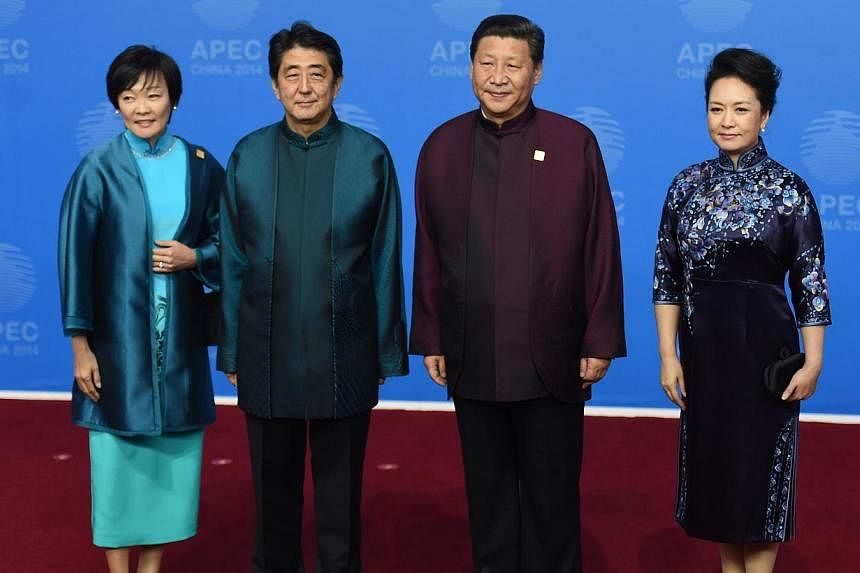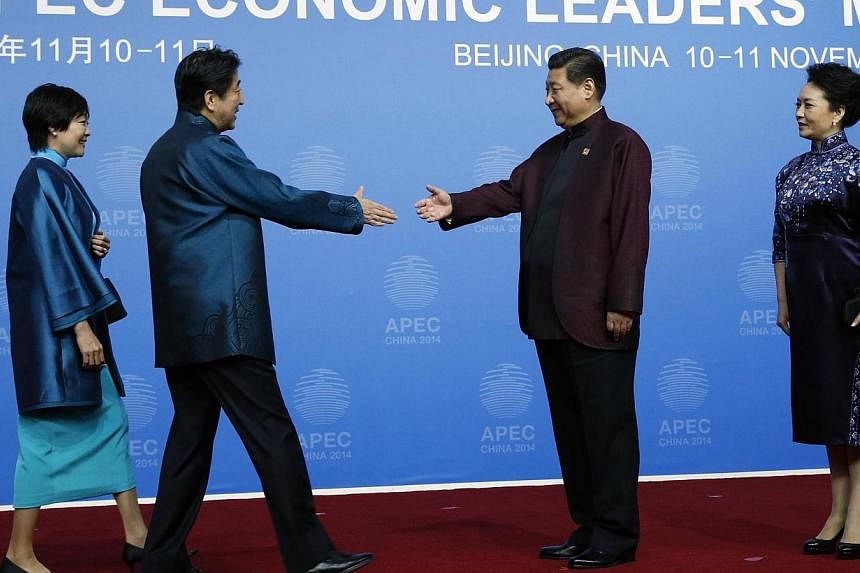Chinese President Xi Jinping and Japanese Prime Minister Shinzo Abe's first meeting on Monday was chilly on the face of it, but the fact that they met was a good sign, said analysts.
The meeting of the two leaders at the annual summit of the 21-member Asia-Pacific Economic Cooperation (Apec) grouping held in Beijing is the first sign of warming relations between the two Asian powers since territorial disputes flared up in 2012.
Mr Abe told reporters after the meeting that he proposed the setting up of a maritime communication link to prevent accidental clashes in areas claimed by both nations.
Here's a round up of what the media in China and Japan make of the meeting.
In Japan
The Yomiuri Shimbun, on it's English website The Japan News gave a straightforward account of the meeting with the headline "Summit called '1st step' in mending ties". But it said Mr Xi was "expressionless" when Mr Abe spoke to him. The conservative paper, which has the largest circulation in Japan, attributed his cool response to "harsh public opinion in China regarding Japan".
The English website of the left-leaning Mainichi Shimbun omitted all mention of the apparent reluctance shown by the leaders when they met, focusing on the proposed "maritime communication mechanism" proposed by Mr Abe, and his remarks that this was the first step towards improved relations.
The Asahi Shimbun's English website said that Mr Abe and Mr Xi confirmed that they will develop Japan-China relations based on "strategic mutual-beneficial relations". In an editorial, it points out that "It is highly unusual that the new leaders of the world's No. 2 and No. 3 economies have not met". However, the liberal paper recognised the achievements of diplomats on both sides for having even engineered a meeting, and was cautiously optimistic on ties based on "common strategic interests".
Wire agency Jiji Press reported that a sense of relief was spreading among Japanese businesses operating in China after meeting. "China-bound investment by Japanese companies is now expected to recover", it said.
In China
The news of the Xi-Abe meeting was less prominent on Chinese news sites, as they focused instead on Mr Xi's vision of a Chinese-driven "Asia-Pacific dream", which he offered in his speech to the summit.
The nationalist Global Times gave the headline "Rights and wrongs crystal clear: Xi to Abe" to an article that stated upfront it was Japan that requested the meeting, and that they were under pressure to mend ties with China. It also emphasised concessions made by the Japanese to secure this meeting, including adhering to prior admissions on Japan's responsiblity in World War II, and on the issue of comfort women. It also said Mr Abe would be less likely to visit the Yasukuni shrine in future. The shrine, which honours Japanese war dead, has been a frequent point of friction between the two countries.
China Daily, the state-run English newspaper and website, gave a more balanced coverage, noting Mr Xi's call for Japan to honour its remorse about its "wartime history", but also emphasising that the meeting was the start of trust-building between the two neighbours. It made sure to point out that Mr Xi told Japan that "the right and wrong behind serious obstacles in the China-Japan relationship in the past two years is clear".
Along with news reports on the meeting, Sina.com, China's largest Chinese-language web portal, also carried an article on the possibility that Mr Abe would stop visiting the Yasukuni shrine. Another popular news site, Chinanews.com carried an analysis with the headline "Improving ties still needs hard work". While there is now hope that ties will put back on track, there is no guarantee that there will be "sunshine after the rain", it said.
A commentary carried by the official Xinhua news agency put the onus on Mr Abe to thaw ties, saying: "It is Tokyo that cast the ice spell on China-Japan relations; it is also Tokyo that called for the Xi-Abe meeting. Now that Abe has talked the talk, he now needs to walk the walk."




